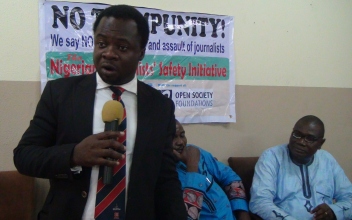By Funmi Falobi
The Director General of the Nigerian Institute of Advance Legal Studies (NIALS), Professor Adedeji Adekunle has identified infrastructural deficit, inadequate man power and knowledge gap as hurdle to open access governance in Nigeria.
This was disclosed at a stakeholder’s forum on open access, organised by the Creative Commons, in partnership with the Nigerian Institute of Advance Legal Studies (NIALS). The programme, which focused on creative, common and access to content, brought together government agencies, members of the academia, lawyers, analysts, students, business owners, technological start-ups and social media experts.
Adekunle, who was represented by the Director of Studies at NIALS, Prof Anmi Awah, said although infrastructure development is key,
“we will not wait until we have a wide spectrum of infrastructure before we follow the rule guiding use of materials online which should be followed to the letter.”
Consequently, Head of Regulatory Department of Nigerian Copyright Commission, Mr. Michael Akpan, said that the Federal Government will amend the Copyright Act to make it more digitally-compliant.
According to him, the country’s new copyright system, like similar regimes, reflects key fundamental policy thrust.
He said the system was designed “to strengthen the copyright regime in Nigeria, to enhance the competitiveness of its creative industries in a digital and knowledge-based global economy; to effectively protect the rights of authors to ensure just rewards and recognition for their intellectual efforts while also providing appropriate limitations and exceptions to guarantee access to creative works, encourage cultural interchange and advance public welfare.”
Akpan noted the new draft bill for the protection of intellectual properties in Nigeria expanded the scope of limitations and exceptions to make allowances for more free uses of creative works particularly in the context of educational and non commercial activities.
He stressed that the task of shaping copyright for the digital network environment should not be restricted to the legislative dimensions of copyright law, but must take into account, how copyright is managed in practice.
He added that the reforms of the copyright system should be beyond new legislative provisions and that, changes in policies, copyright culture and practice may in fact be more relevant than changes to the legislation.
He said that open access is important to the growth of the information society as information and knowledge has become the greatest building blocks for societal development.
“Nigeria is a developing country at the throes of maximizing its huge human and natural resources. One of the roads to achieving this is the platform provided by open access which provides free online access to information which anyone may require,” he said.
He added, “Nigeria is endowed with a population predominantly made of youths with undeniable creative capacities who can utilize this platform to gain knowledge and how that will eventually change the fortune of our country”.
Technical Lead, Creative Common Nigeria, Mr. Kayode Yusuf said that the forum is set to create awareness and support for open access among stakeholders in Nigeria.
“For a country in the process of reforming its copyright laws to align with current requirements of the digital age, the concept of ‘open’ cannot be ignored”, he noted, adding, “that it is clear that the philosophy of ‘openness’ in any form of knowledge governance is still a strange phenomenon in Nigeria. The level of awareness and scale of implementation of the different models of openness in knowledge governance in the country are insignificant in proportion to its size, needs and population.”
He said the concept of open access has a lot of potentials for Nigeria as it will open more access to data, information and education that are needed to galvanize development.
“We will continue to engage the various stakeholders and entrenched the merits of open in addition to the fact that it is in perfect alignment with digital technology as the principal means of knowledge production and dissemination today. The philosophy of ‘open’ in knowledge governance and its merits can be seen in both the public and private sectors in education, research, governance,” he said.




